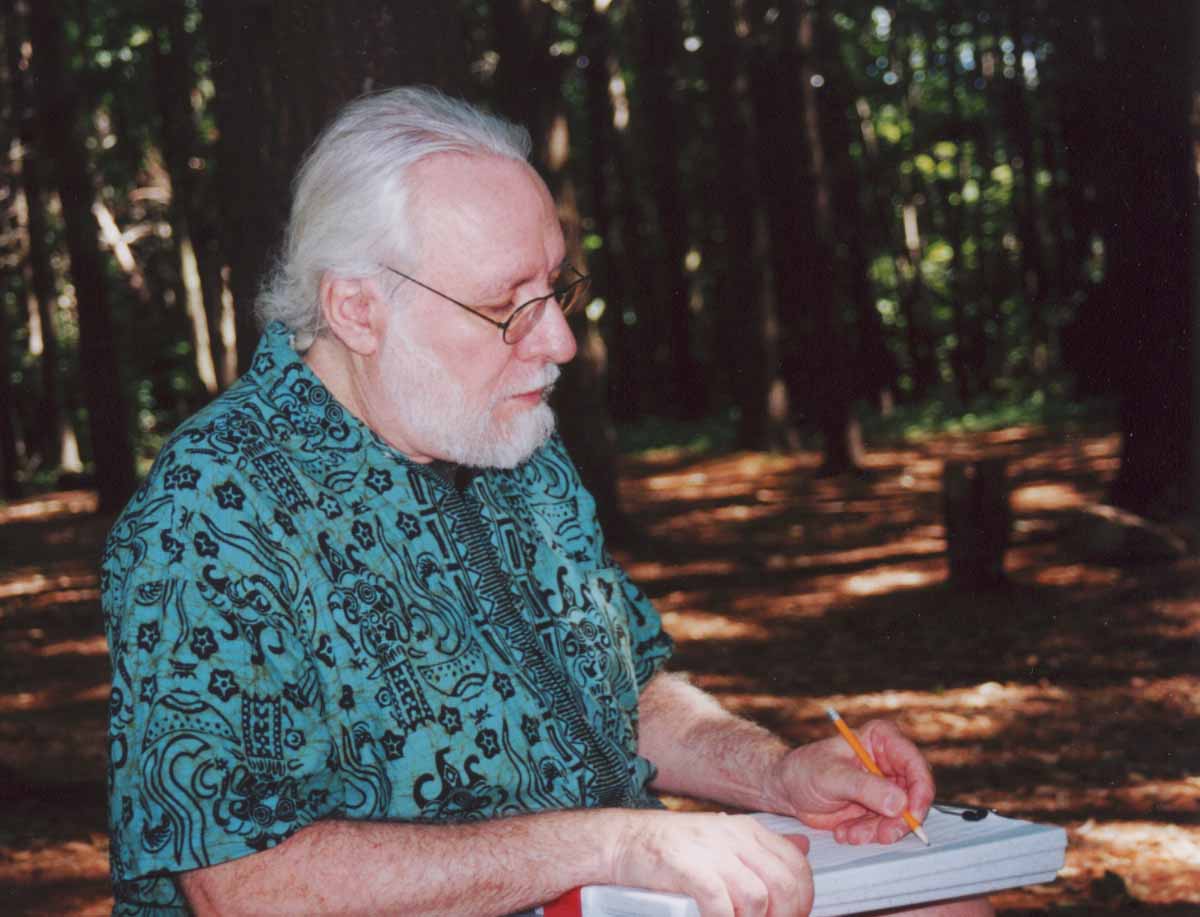General Information
Playing Outside
Program Notes
Playing Outside was conceived in 1996 and composed from January to August 2001. It is
scored for about 65 musicians (chorus, orchestra, and four improvisors)
and the Eastman Balinese gamelan "Lila Muni." playing solos and
concerted music in ten locations in Webster Park. The musicians move from
one location to another to form different ensembles within the 100 minute
timespan of the piece. Sometimes they play in transit from one place to
another.
Playing Outside has about 40 sections of music, each of which has a name, location, starting
time, and duration from one to eleven minutes. (For instance, section 19
is called "Symphony 1 (The Altus)," played at Onondaga cabin (location
E), starts at 2:08 pm (or in the second performance at 5:08), and lasts
ten minutes. Many sections are played at the same time, but in different
locations.
The
conception for this piece occurred to me while hiking on the intricate web
of ski-trails in Webster Park in the summer of 1996. I was so fascinated
by these trails I made a map of them with a friend. I felt a connection
between these trails and the kind of music I write, so I thought it would
be interesting to bring them together in a musical composition. This music
would not be concert music per se, but something like ambient music, where
the music blends into the environment—in this case, into the sounds
and sights of the fields and forests of the park.
While
many of my initial ideas for the piece had to be refined or dropped to make
the piece practical for performance, one thing has remained unchanged from
the beginning. The music is not concert music played outdoors,
even though it is written for musicians who ordinarily play concert music.
The music is less formal than concert music and employs special notation
to permit various degrees of improvisation. The pacing of the piece is often
relaxed, spacious, and sometimes ritualistic, in contrast to the social
rhythms of music in most cultural settings.
I
chose the title Playing Outside since it so pertinently
suggests my musical conception. In jazz, playing
outside denotes the practice of playing without chords, either modally
or atonally, and without clear meter or even beat; the emphasis is on gesture
and timbre. The allusion of the title to sports such as baseball suggests
a conception of time where there is a distinction between "time in"
and "time out." A baseball game, for instance, has times in which
the game action takes place versus times between these actions, between
innings, batters, pitches, etc. Thus the 100 minute span of the piece contains
people making music, but also people moving from one place to another, enjoying
the natural setting, sharing all the sights and sounds in the park. Furthermore,
this music has no musical "themes" or "accompaniments", no clearly articulated voices, no sections,
nothing exactly repeated. Its form is flow. Not the fixed forms or formulas
of some traditional music, but formation and transformation, multiple processes
of growth and decay, continuously developing, not without points of repose
or abrupt change. No one will be able to hear all of this piece, part of
it is always imagined.
I
composed Playing Outside in Webster Park, writing
the music exactly where it would be played. The only difference would be
the time of performance, autumn. While I composed, I was often visited by
animals, especially deer. Autumn and Deer suggested texts for the singers
to sing. I used fragments of Japanese Haiku, the Chinese classic I Ching, the Old Testament, Kalidasa's
play Shakuntala, and texts by
Ralph Waldo Emerson and Samuel Becket.
—Robert Morris
Enjoying Playing Outside
Playing
Outside is conceived for an audience that will explore the performance space
strolling from one place to another to hear various sections of music performed
in natural environments such as fields, meadows, groves, and wooded paths.
Keep
in mind that there is no way to hear all the music in the piece, even if
one attends both performances, so there is no need to rush about trying
to hear as much as you can. You might only hear ten different sections,
but that's certainly enough to get a feel for the diversity and character
of the piece. As a result, each person's experience of Playing
Outside will be different. (This happens even in the concert hall where
everyone is listening to the same performance of a piece.)
To
help you get around the performance space of the piece—about a half
a mile square, I have listed below the ten locations of the piece, provided
a map, and listed the sections of the piece in the order in which they occur.
By consulting the map and list, you can plan to be at a time and place to
hear a particular section. Or you might want to stay a particular location
for a while and have the musicians assemble there to play more than one
section of music. You will also see musicians walking to their next playing
location; you can follow them around the park to hear the various sections
they play. We also have guides to lead audience members to some of the musical
sections. Some of you might just want to walk about, coming upon music fortuitously.
The
information table at the main road will have further information about the
piece; this is the place to assemble before the performance to be guided
through the piece.
I
hope you enjoy this experience. Good
luck!
—Robert Morris
Locations
|
A |
West Field |
|
B |
Brook Slope
South of West Field |
|
D |
Mohawk Cabin |
|
E |
Onondaga
Cabin |
|
F |
Field with
Flag Pole |
|
G |
Ryan's Point
Tenting Area |
|
I |
Grove near
Seneca Cabin |
|
J |
Catteraugus
Cabin |
|
K |
Grove North
of Catteraugus Cabin |
|
L |
Mid Way
Picnic Area |
Schedule of Events (Sorted
by time)
|
Name |
Starting
time |
Location |
|
Concerto
by the Brook |
1:30 4:30 |
B (Brook South
of West Field) |
|
Forest
Ritual |
1:30 4:30 |
L (Mid Way picnic
area) |
|
Calls
amid Sky |
1:30 4:30 |
F (Field with
Flag pole) |
|
Vines
and Undergrowth |
1:30 4:30 |
I (Pine grove
near Senena) |
|
Autumn
Shade (Gamelan) |
1:36 4:36 |
D (Mohawk cabin
area) |
|
Bones
on Meadow |
1:40 4:40 |
F (Field with
Flag pole) |
|
Stream
Walk |
1:41 4:41 |
B to L |
|
Dryad,
Low and Gruff |
1:40 4:40 |
I (Pine grove
near Senena) |
|
West
Field Duet |
1:45 4:45 |
A (West Field) |
|
From
"Woodnotes" |
1:47 4:47 |
G (Ryan's Point
tenting) |
|
Shadows
Disagree |
1:49 4:49 |
L (Mid Way picnic
area) |
|
Mohawk
Fanfare |
1:49 4:49 |
D (Mohawk cabin
area) |
|
At
Crossroads |
1:49 4:49 |
F (Field with
Flag pole) |
|
Point,
Circle, and Line |
1:54 4:54 |
F (Field with
Flag pole) |
|
Trellis |
1:54 4:54 |
J (Cattaraugus cabin area) |
|
Horns
Alone |
1:55 4:55 |
L (Mid Way picnic
area) |
|
Autumn
Smoke |
1:55 4:55 |
I (Pine grove near Senena) |
|
Mohawk-Onondaga
March |
1:56 4:56 |
D to E |
|
Bedrock
with Thorns |
2:04 5:04 |
J (Cattaraugus
cabin area) |
|
Autumnal
Voices |
2:06 5:06 |
G (Ryan's Point
tenting) |
|
Symphony
2 |
2:08 5:08 |
G (Ryan's Point
tenting) |
|
A
Prelude |
2:07 5:07 |
E (Onondaga cabin
area) |
|
Symphony
1 (The Altus) |
2:08 5:08 |
E (Onondaga cabin
area) |
|
Symphony
3 |
2:08 5:08 |
J (Cattaraugus
cabin area) |
|
Autumn
Shade/Running Deer (Gamelan) |
2:20 5:20 |
D (Mohawk cabin
area) |
|
Canon
at Cattaraugus |
2:23 5:23 |
J (Cattaraugus
cabin area) |
|
Moss
(with Squirrels) |
2:25 5:25 |
L (Mid Way picnic
area) |
|
Usurpation |
2:31 5:31 |
L (Mid Way picnic
area) |
|
Hidden
Frogs |
2:26 5:26 |
I (Pine grove near Senena) |
|
Capriccioso
I. |
2:27 5:27 |
F (Field with
Flag pole) |
|
Capriccioso
II. |
2:30 5:30 |
F (Field with
Flag pole) |
|
Insect
Walk |
2:27 5:27 |
E to D |
|
Gamelan
March |
2:29 5:29 |
D to E |
|
Lost |
2:32 5:32 |
K (Pine grove
North of Cattaraugus) |
|
They
Listen to Apollo |
2:35 5:35 |
I (Pine grove
near Senena) |
|
Drumming
Paths |
2:37 5:37 |
D (Mohawk cabin
area) |
|
Three
Roads |
2:40 5:40 |
Between I and J |
|
Running
Deer (Gamelan) |
2:40 5:40 |
E (Onondaga cabin
area) |
|
Chanting/Shakuntala |
2:43 5:43 |
A (West Field) |
|
Recounting
Miracles |
2:43 5:43 |
D (Mohawk cabin
area) |
|
"It" |
2:43 5:43 |
G (Ryan's Point
tenting) |
|
Taking
Leave |
2:54 5:54 |
|
|
The
Rest Stop |
2:56 5:56 |
Between L and G on main road |
|
On
the Edge |
2:58 5:58 |
F (Field with
Flag pole) |
|
The
Gathering |
3:03 6:03 |
F (Field with
Flag pole) |
|
Cadenza
on the Field |
3:08 6:08 |
F (Field with
Flag pole) |
Map


